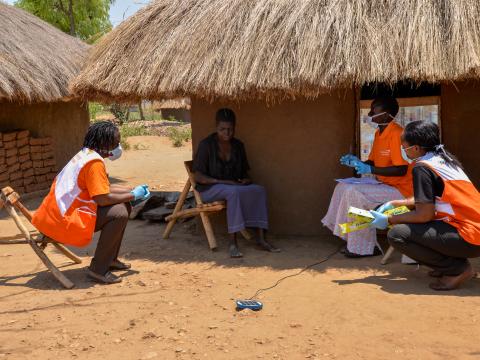COVID-19 presents a double crisis for refugees

By Mary Njeri
We all must have learned a thing or two with the ongoing coronavirus pandemic. Life can change in an instant!
For months now, billions of people have been locked inside their homes after countries imposing lockdowns at one point or another. The stark contrast to this, however is that for years now, over 25 million refugees have been literally locked outside of their homes instead. Half of this number are children whom, as a result of conflict, had their education, peace, and growth disrupted.
This ironic situation invites us to look at the issues that we have ignored in the past. Stop for a second and imagine how fast life can change in the blink of an eye. Many refugees in settlements tell stories of how they were previously in their kitchens cooking, or walking back home from school, or attending a church meeting, when the shooting started. They scattered and fled, most of them running away with nothing but the clothes on their body. Some of them have now been in settlements for over four years. Their land, cattle, academic certificates, buildings, and everything else they ever owned, are now a distant tale.
This is how much one’s life can change in a matter of seconds. When COVID-19 struck, flights were canceled, businesses closed, and jobs were lost. That sudden change, loss, uncertainty, and fear is what refugees have to go through on a daily basis.
As if fleeing their countries was not enough, refugees now have to deal with another crisis; one that will most likely worsen their lives. COVID-19 has already had a dramatic effect on refugees and those living in war-torn areas, where access to healthcare, good hygiene and sanitation, education, and food security are already a challenge. A big number of the world’s vulnerable children in refugee settlements are separated and unaccompanied. They mostly live with elderly caregivers who are at a high risk of mortality from the virus.
As we mark World Refugee Day this year, it is important to know that refugees are among the most vulnerable people in the world. Their already-precarious situation has worsened with the effects of the novel coronavirus. Ongoing restrictions on movements, the closure of schools and child-friendly spaces, business limitations, and all the other measures in place have further protracted their vulnerability.
This day is also meant to celebrate the strength and courage of people whose lives had previously crumbled, but now stand up amidst a pandemic crisis to stay alive, fight and rebuild. I have had an opportunity to witness the amazing work done by the World Vision Child Ambassadors in Omugo refugee settlement. These children are spreading Coronavirus awareness messages to their peers using megaphones. I have met a 23-year-old teacher in Bidibidi who has decided to voluntarily teach children in his village. His kind gesture is a way of ensuring that these children don’t miss out on what is being taught on radio and television, which they cannot access. I have also read about Charles, a 42-year-old South Sudanese in Bidibidi, who has opened his home to children in his village to learn through his television, the only television set in the village. It is such hidden heroes, and their level of resilience, that appeals to all of us to step up and support their communities. Everyone can make a difference; every action counts.
World Vision is undertaking the largest humanitarian response in its 70-year history to limit the spread of COVID-19, and reduce its impact on vulnerable communities. The organisation has committed a $350 million budget, to reach communities with awareness and preventive messages, support education continuity, support health centres and workers with protective wear, provide soap and hand-washing facilities to communities, help support livelihoods in the recovery phase, et cetera.
Most of us have never imagined what it means or how it feels like to deal with something so unfortunate and devastating. Something that could change yours and your children’s lives in an instant. While some of us could be locked inside our homes, with no work and freedom of movement due to the current pandemic, we still have access to certain basic services. This is not the case for the 1.4 million refugees in Uganda, who were forced into fleeing their homes, and settling in a foreign land. Now, they struggle to access a lot of basic services, especially due to the ever-dwindling funding, and now the COVID-19 pandemic.
